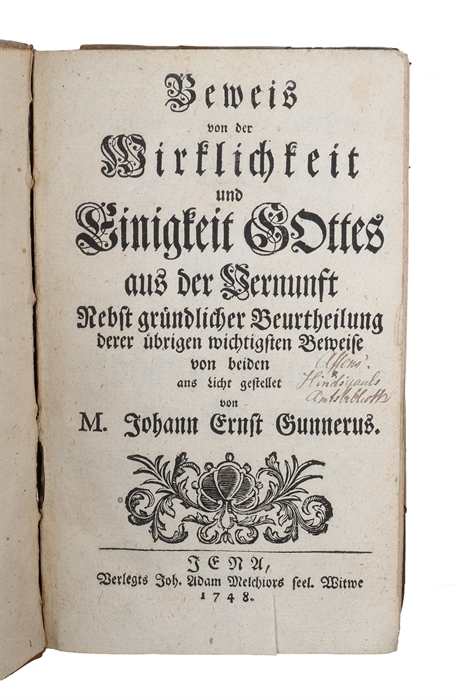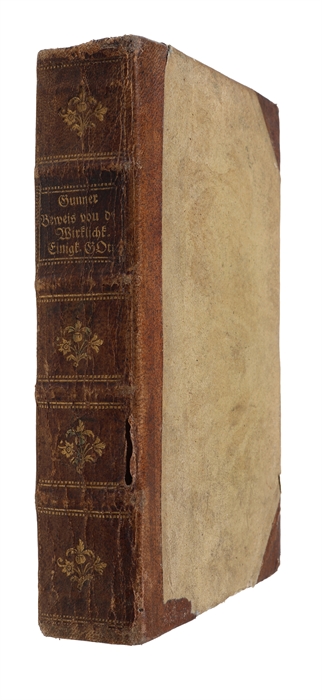"ONE OF THE FOUNDING FARTHERS OF MODERN NORWEGIAN CULTURE"
GUNNERUS, JOHANN ERNST.
Beweis von der Wirklichkeit und Enigkeit Gottes aus der Verhuft.
Jena, Woitwe, 1748.
8vo. In contemporary half calf. Binding with wear. A few holes to spine. Hinges a bit weak. Previous owner's name to title-page and lower outer corner of title-page with loss of paper (not affecting text), otherwise internally nice and clean. (16), 533, (1) pp.
First edition of this exceedingly rare philosophical treatise aiming to demonstrate the existence and unity of God through rational argumentation – a fine early example of Scandinavian Enlightenment philosophy. In this work Gunnerus critiques and builds upon traditional arguments for God's existence, such as those by Anselm and Descartes. He uses a logical method, referencing thinkers like Wolff, Leibniz, Darjes, and Descartes, as well as critics of Wolffian philosophy including Joachim Lange and Christian August Crusius. “Although recognized by scholars of eighteenth-century Danish-Norwegian cultural and political history as an influential figure in the Norwegian Enlightenment, with impressive transnational connections, Johan Ernst Gunnerus (1718– 1773) receives scant mention outside the Norwegian discourse in discussions on the siècle des lumières. His influence and accomplishments, especially in the context of eighteenth-century ecclesiastical politics, as well as his scholarly explorations in diverse disciplines, distinguish him as one of the founding fathers of modern Norwegian culture. Born in Christiania, the son of a physician, Gunnerus’ intellectual preoccupation extended beyond theology.2 In line with the decree issued by King Christian VI in 1741 that all Danish-Norwegian theology students study at the University of Halle, Germany, which was a centre of multiple influences, such as the Protestant Reformation, Pietism and German Enlightenment, Gunnerus also attended lectures on natural history and law upon enrolling at the university in 1742. In 1744, he moved to Jena, where he graduated, worked as a tutor, and eventually, in 1753, became an adjunct there at the Department of Philosophy. However, within a year he left for Denmark, where he first became a pastor, then appointed professor in Copenhagen and eventually bishop in Norway, at a time when the entire country had a total of only four bishops and 480 pastors.3 From 1758 to 1773, Gunnerus served as bishop in Trondheim and became, in 1760, one of the founders of the Royal Norwegian Society of Sciences and Letters. In all these areas, he maintained close contact with diverse circles of Continental scholars, and not just with those he had known during his time in Halle and Jena. As such, he can be considered an important agent of cultural transfer between Norway and mainland Europe, and vice versa.”( Stengel, Johan Ernst Gunnerus and the Quest for the Soul in the Eighteenth Century). Exhibited as no. 40 in the Danish Bibliophile Association's 60s Anniversary Exhibition.
Order-nr.: 62323


